Key takeaways:
- Understanding diverse learning needs is crucial for effective teaching, allowing for tailored approaches that meet individual student strengths and challenges.
- Flexible assessments can reveal hidden talents and guide educators to modify teaching strategies for better student support and understanding.
- Personalizing assessments based on students’ interests and preferred learning methods enhances engagement and fosters deeper learning.
- Creating a supportive environment where students feel safe to express their concerns and preferences significantly impacts their academic success and confidence.
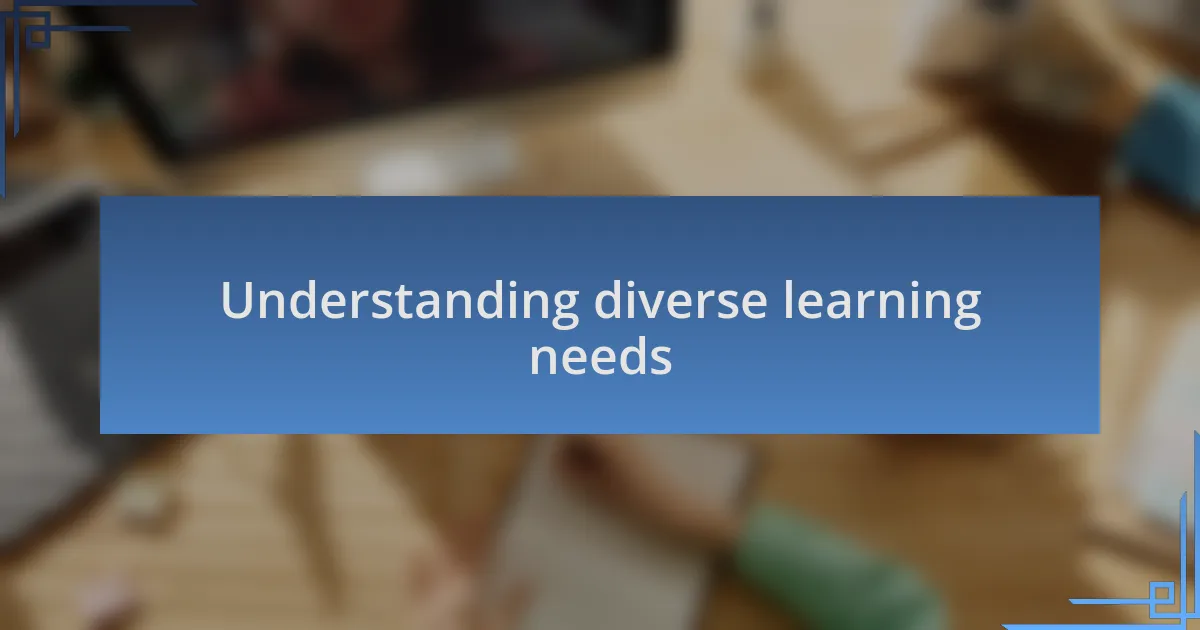
Understanding diverse learning needs
Understanding diverse learning needs is vital for creating effective educational environments. I remember working with a student named Max who struggled with reading due to dyslexia. It was eye-opening to see how different his learning style was; instead of traditional approaches, he thrived when we incorporated visual aids and hands-on activities. How often do we overlook such unique approaches in our teaching methods?
Each learner’s background and experiences shape how they absorb information. For instance, a quieter student in my class once revealed how anxiety overwhelmed her during standard assessments. This moment taught me the importance of flexibility; I realized that providing a comfortable, supportive space can significantly impact their learning outcomes. Have you ever considered how stress might affect a student’s ability to perform?
Embracing diverse learning needs also calls for patience and creativity. When I designed assessments for a group of learners with varying abilities, I found it rewarding to see progress tailored to each individual’s strengths. Adapting methods to include choices, like oral presentations or artistic projects, allowed students to showcase their understanding in their own way. Isn’t it fascinating how diverse approaches can unlock a wealth of potential?
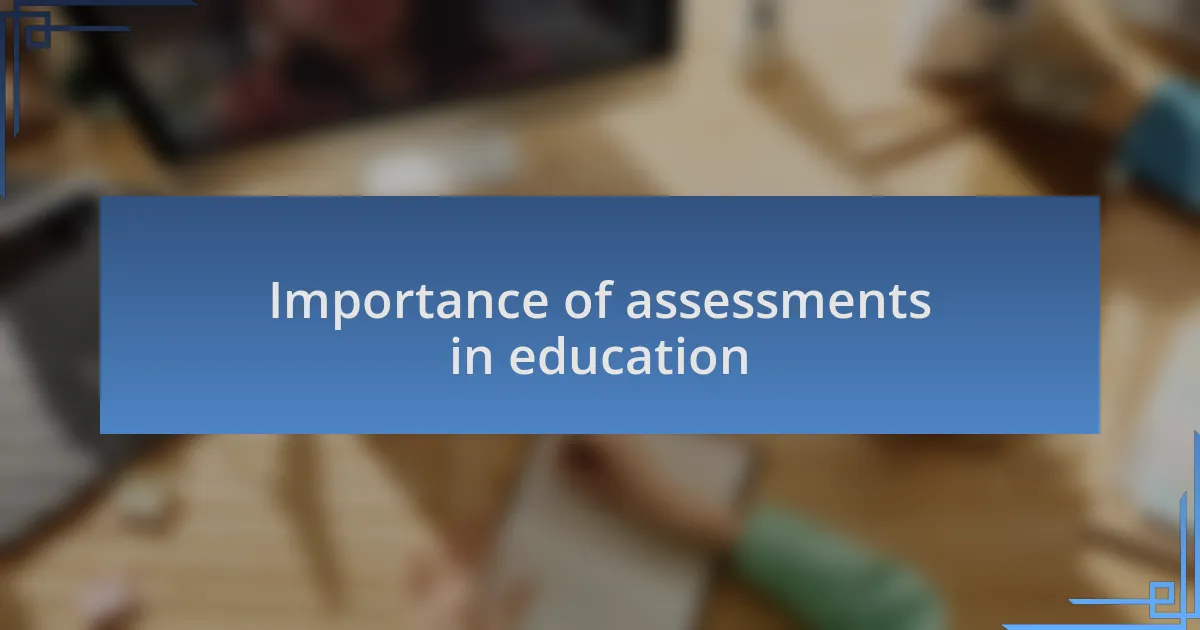
Importance of assessments in education
Assessments serve as vital tools in education, acting as a lens through which we can evaluate a learner’s needs and progress. I recall developing a quiz for my class that allowed for different response formats. This flexibility revealed unexpected insights; one student who usually struggled with written tests shined in a verbal presentation. It made me wonder, how many hidden talents might we overlook if we adhere to a rigid assessment structure?
Moreover, assessments allow me to measure not only knowledge but also the effectiveness of my teaching strategies. I remember reflecting on a mid-term assessment that showed many students facing difficulties with a specific concept. This prompted me to rethink my approach entirely. Have you ever had a moment where an assessment directed you to reshape your teaching style for the better?
It’s essential to recognize that assessments are not just about numbers or grades; they also highlight areas where students feel most comfortable or challenged. A poignant moment for me was when a student confided that standardized tests made her feel inadequate. This shaped my understanding that assessments should be the starting point for conversations about learning rather than just a finish line. Isn’t it crucial for us educators to use assessments as a means to foster understanding and support rather than just evaluate performance?
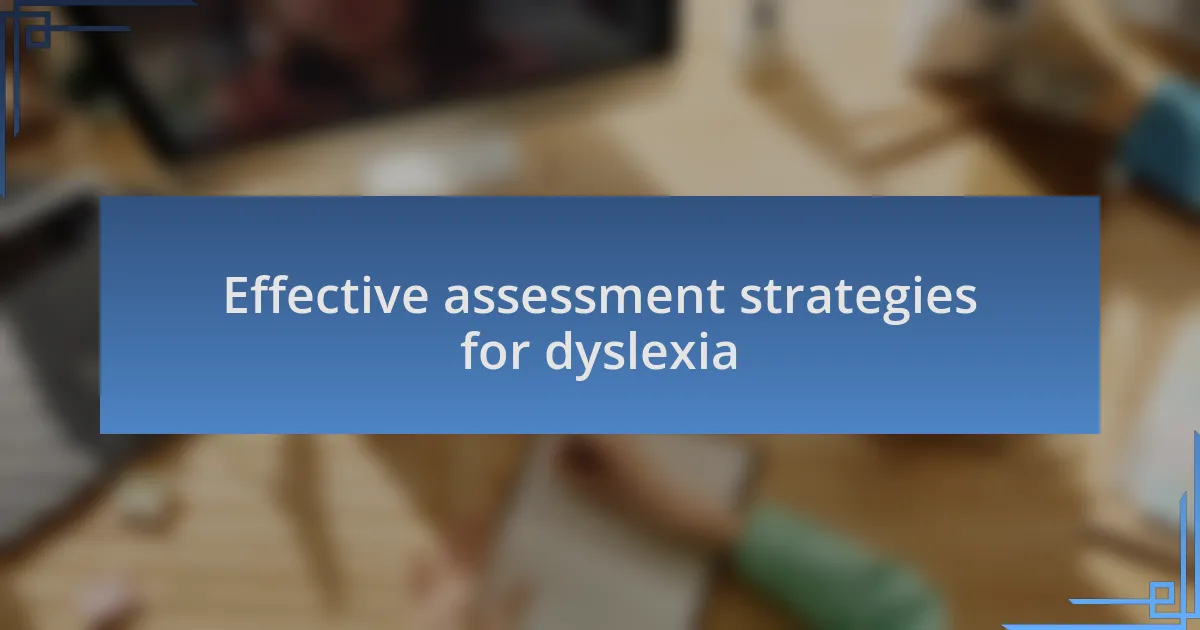
Effective assessment strategies for dyslexia
Effective assessment strategies for dyslexia should prioritize a variety of methods to capture the multifaceted skills of each learner. I remember using a blend of informal reading observations and structured assessments in my classroom to truly understand my students. One particular assessment involved a combination of dictation and creative storytelling, which allowed a student who struggled with written language to express his thoughts fluently. How often do we miss the rich narratives hidden behind rigid testing formats?
In addition to diverse methods, I’ve found that formative assessments—those ongoing checks throughout the learning process—can be particularly enlightening. They provide timely feedback that informs my teaching and helps students gain confidence. For instance, after implementing a quick check-in task where students read aloud to me, I discovered profound insights into their pronunciation and comprehension skills. Have you considered how a simple, informal interaction could unveil a student’s true potential?
I also believe that involving students in their assessment process can lead to richer outcomes. One of my most impactful experiences was allowing my students to participate in designing their own assessment projects. This not only empowered them but also encouraged ownership of their learning journey. Isn’t it remarkable how giving students a voice can spark motivation and self-awareness in their educational experience?
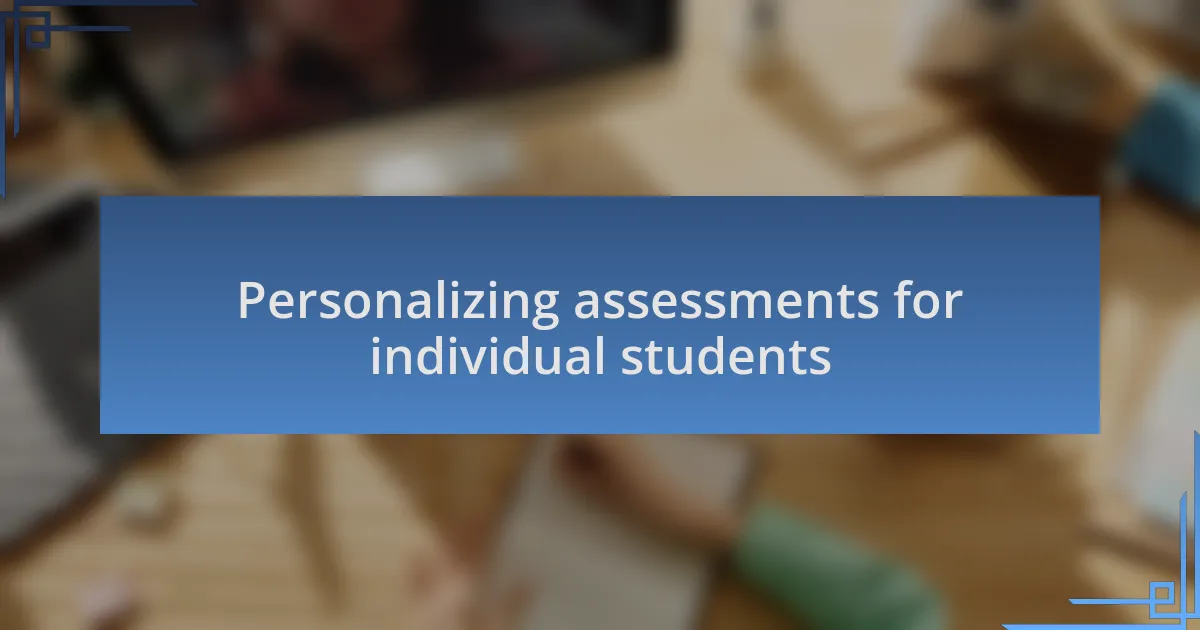
Personalizing assessments for individual students
Personalizing assessments for individual students is crucial for addressing their unique learning needs, especially in the context of dyslexia. I once worked with a student who thrived when given a choice of assessment formats. By allowing him to complete a project that included visual elements, like creating a poster, I saw a remarkable transformation in his engagement and understanding. Have you ever noticed how much more students can express their knowledge when the assessment aligns with their strengths?
In my teaching experience, I’ve often tailored assessments to include students’ interests and preferred learning styles. For one student who loved music, I integrated song lyrics into reading assessments. Instead of feeling pressured, he enjoyed analyzing the lyrics, which opened up a new world of comprehension for him. Isn’t it amazing how a simple shift in approach can ignite passion and lead to deeper learning?
It’s also essential to regularly check in with students about their assessment preferences. I remember a time when I directly asked my class how they felt about their assessments. Their feedback helped me realize that some preferred oral assessments over written ones. By adapting based on their input, I fostered a more inclusive environment. How often do we consider student voices in shaping their own learning experiences?
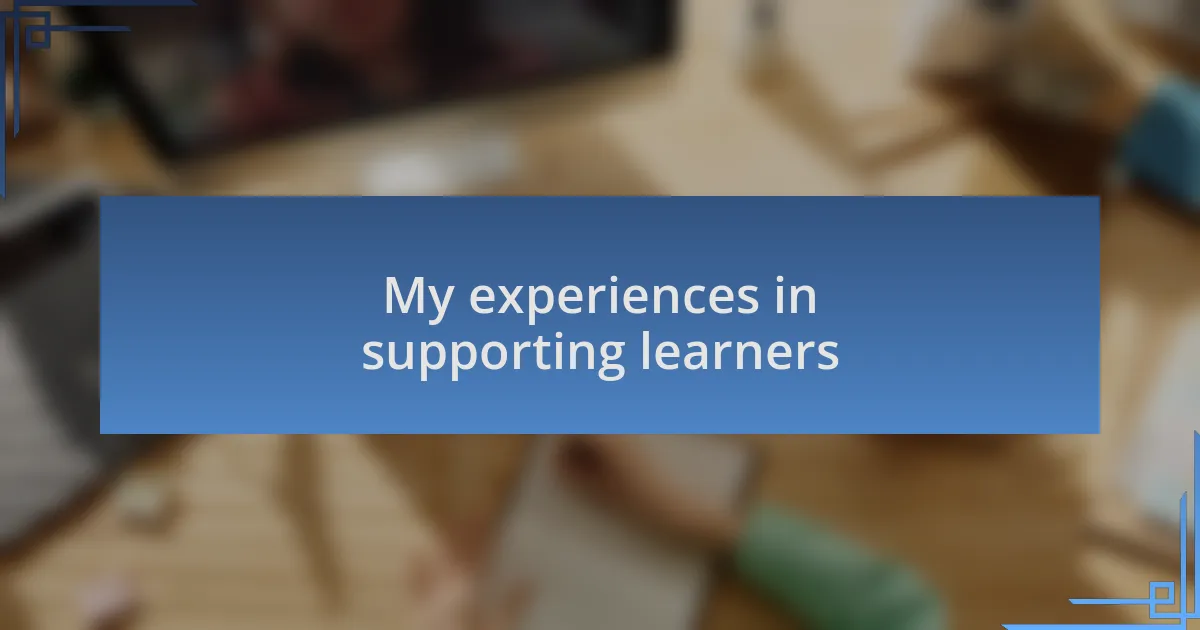
My experiences in supporting learners
Throughout my journey in education, I have often found myself immersed in the rich tapestry of diverse learners’ experiences. For instance, I once guided a student who struggled with traditional reading assessments. When I introduced a storytelling element, allowing him to narrate his understanding through voice recordings, his confidence blossomed. It made me realize just how powerful it can be to give students a voice that suits them best.
One memorable experience involved a group of students who were hesitant to engage with math problems because of their complexity. I vividly remember transforming those problems into interactive games, where students could collaborate and learn from each other. It was heartwarming to witness them laughing and sharing strategies, turning what once seemed like a chore into an enjoyable challenge. Have you ever felt that electric moment when learning clicks for a student?
I also cherish the moments when I’ve been able to create a safe space for students to share their fears and frustrations about assessments. After facilitating a discussion about these challenges, one student confided that she dreaded timed tests. Together, we devised a plan that included extended time and breaks, which ultimately alleviated her anxiety. It’s moments like these that remind me of the profound impact listening and adapting can have on a learner’s success. How often do we pause to truly listen to our students’ needs?